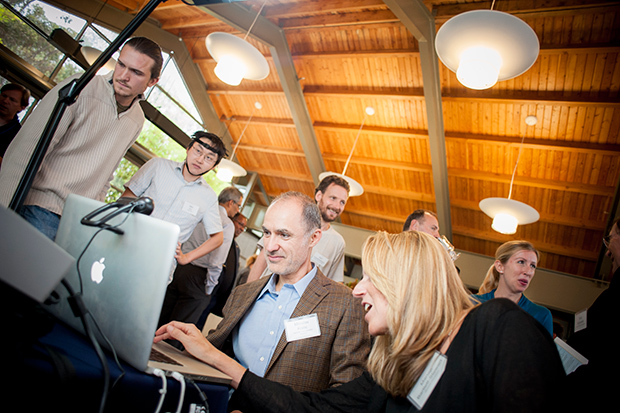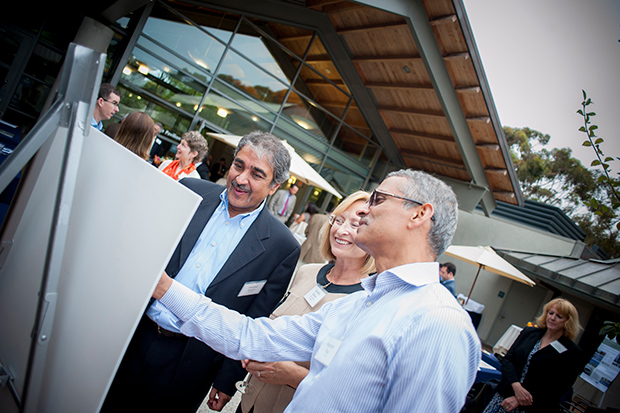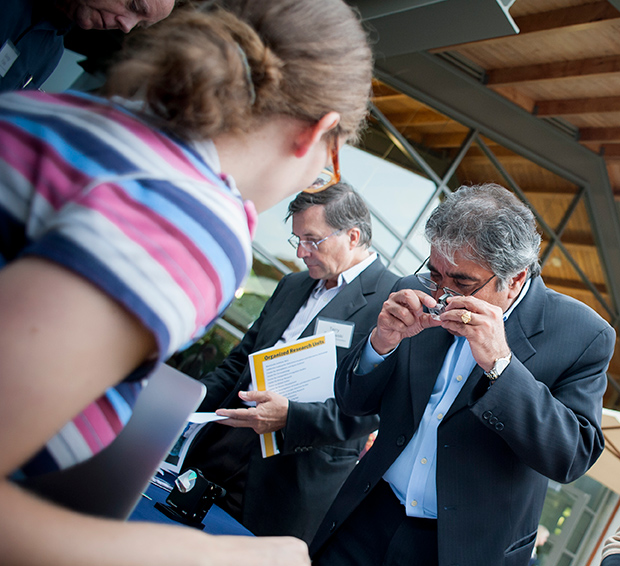By:
- Paul K. Mueller
Published Date
By:
- Paul K. Mueller
Share This:
Research Directors Highlight Their Contributions

Photos by Erik Jepsen/UC San Diego Publications
Late last month, the directors of the 20 campus Organized Research Units—as part of Chancellor Pradeep K. Khosla’s “Making Connections” plan to learn the campus’ strengths and centers of excellence—presented a display of their achievements and contributions to the Chancellor and to many of their industry partners in the region. Hosted by Sandra Brown, Vice Chancellor for Research, the briefing featured remarks by Brown and Khosla, and trade-show-style exhibits and demonstrations by the ORU directors.

In her introduction, Brown praised the research units as "pillars of multidisciplinary, trans-campus scholarship and engines of entrepreneurial initiative," and noted that the units are the principal home to hundreds of self-supported research scientists who bring tens of millions of dollars in revenue, and strongly support UC San Diego's graduate rankings.
The Chancellor, in his remarks, emphasized that the university's task is to "tackle challenges of global consequence," and that because such challenges are complex, their solutions must also be complex. "That is where your work comes in," Khosla said. "You are models of the interdisciplinary research that is transforming institutions across America and around the world. By bringing together brilliant minds from the university, government and industry, we can pool our resources and talent, advance knowledge, and further our positive impact on society."
As he began his tour of the research-unit demos and displays, he expressed his appreciation to the directors for their efforts. "Thank you for the work that you do," he said. "You are making our campus and our world a better place."
Some of the highlights Khosla learned:
The Institute of Engineering in Medicine has established groundbreaking international collaborations with universities in Taiwan, China, Singapore, UAE, Italy, and Australia.
The Institute for Neural Computation is developing a new generation of optical devices to solve problems in vision, speech recognition, and motor control.

The Center for Chronobiology established the UCSD Chronobiology Symposium as an international forum for researchers in the field.
The Center for Human Development houses the Pediatric Imaging, Neurocognition and Genetics (PING) Project, a signature NIH genomics data resource.
Two Center for Networked Systems researchers are the latest recipients of Google's prestigious Research Award.
Calit2 faculty and staff have filed 139 invention disclosures and produced almost 80 startups.
The Center for Energy Research has been awarded co-lead status on the California Energy Commission's Solar Energy Collaborative.
Faculty members in the Center for Comparative Immigration Studies have published books with six of the leading university-press publishers.
The Institute on Global Conflict and Cooperation leads a UC-wide group exploring the emerging field of "environment and human capital."
Detailed descriptions of all the Organized Research Units, their directors and their research endeavors, can be found here: http://research.ucsd.edu/orus.html
Share This:
You May Also Like
Stay in the Know
Keep up with all the latest from UC San Diego. Subscribe to the newsletter today.



